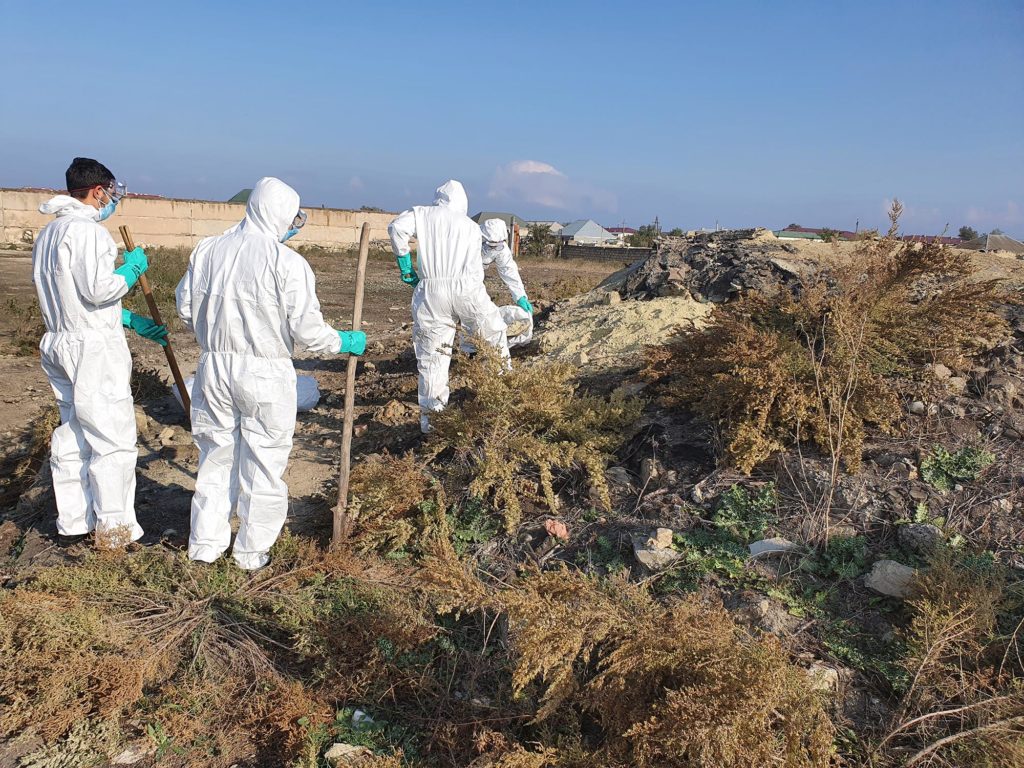
About 25 tons of exposed toxic material was cleared away from this site located near a school and many homes in Ujar, Azerbaijan.
This report is from Rovshan Abbasov from Pure Earth Azerbaijan.
—-
Many people call pollution a slow-moving time bomb. It works not only slowly but also cuts deeply.
A place with pollution is useless in every way. Living with pollution not only harms human health, but also reduces all human and environmental values. Imagine a school or home in a clean environment. It is a pleasure to study and live in such a place. What if the school or home is in a polluted place? Who would like to study or live there?
Therefore, I consider each cleanup project important not only to ensure health, but also to restore lost values, which is what we recently helped to do in Ujar.
Ujar is a small town located in the central part of Azerbaijan. Near its city center is a polluted site that used to be the courtyard of a former pesticide distribution center.
This area was assessed by Pure Earth’s Toxic Sites Identification Program in 2015 in an effort funded by the UN’s Food and Agriculture Organization, and identified as a potential priority site for cleanup since it is located near a school and many homes.
Winds in Ujar would blow and spread dry pesticide powder around. In hot weather, the smell of pesticide floated in the air. Children playing in the school yard and people living nearby always felt the presence of this ticking “time bomb.” In the toxic dust, I saw a long-term killer, and I was determined to find a way to clean up the area.
We have made several attempts to address the “bomb” here. However, a lack of funding prevented us from implementing our plans. This time however, everything happened very quickly. When we met with representatives from the Ministry of Agriculture (as part of our work with the Global Alliance on Health and Pollution developing the Health and Pollution Action Plan for the government of Azerbaijan), they told us that they were ready to clean up the area and could provide assistance.
We held several meetings with local communities and teachers at the nearby school to raise awareness about the contamination and support the need for cleanup. Teachers told us that both themselves and the children were constantly feeling the poisonous air. Many parents had even taken their children out of that school and placed them in another school further away.
As a former Fulbright Scholar, I noticed an opportunity to apply for a small alumni grant program from the U.S. Embassy in Azerbaijan. To my delight, the idea of the cleanup was immediately supported by the U.S. Embassy. This added resource was the final push we needed. We were now ready to start the cleanup.
The Ministry of Agriculture sent representatives to inspect the area. Our Pure Earth team prepared a cleanup plan and submitted it to the ministry. Another working group of local community representatives was established. Taking into account the limited resources available, the cleanup work, administered by the Ministry of Agriculture, was started in the area closest to the school. About 25 tons of toxic substances were removed from the polluted site to a designated pesticide landfill.
Is that all?
No, of course not. Currently, there are more than 130 sites in Azerbaijan that have been assessed by Pure Earth’s toxic site investigators and documented in the TSIP database. Sooner or later, all these areas must be cleaned up. But when and how? This is the main question.
I believe that the Health and Pollution Action Plan we are helping the government develop and implement in Azerbaijan will answer this question. The government now has a plan to follow, and a successful cleanup in Ujar to demonstrate the effectiveness of intervention.
We are even seeing the government use TSIP data in reports such as the Azerbaijan Sixth National Report to the Conservation of Biodiversity. This tells me that they are now committed to moving forward with future cleanups, and we will be there to help them achieve their plan for a cleaner, more healthy Azerbaijan for all.





